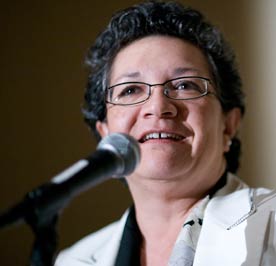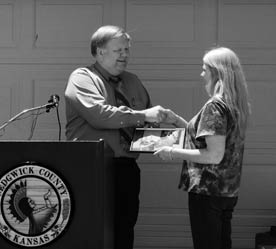In the spring, it looked like people were worried about a lot of the NSP1 funds having to be recaptured because they weren’t going to meet the 18-month deadline in September. What changed between then and now?
I don’t think anything really changed. No startup business is even in its execution. You don’t start, in an 18-month period, one-18th [each month] with the same rhythm. You start up. You design. You get all your partners in place, but the clock is ticking. You do your plan. You get it approved. You might need an amendment. So you’re going to see right around 60, 70 percent [of the way through] a huge bump-up [in implementation].
But the most important thing that businesses need, whether they’re a government business, nonprofit, for-profit, is predictability in the market. [Discussing] recapture is predictability in the market by telling people up front, “This is what’s going to happen [if you don’t fully obligate the funds].”
Internally, we were always much more optimistic than anybody knew because we were watching weekly reports. Of 307 [NSP1] grantees, 305 obligated 100 percent of their funds by the deadline.
And what were the challenges that were met to get to that last quarter? It’s a startup business, but it’s got very uneven players.
Yes, it does. Instead of referring to them as uneven players, let’s say we have uneven market challenges to our grantees. One of the most valuable things that HUD did early was commit to flexible, present, and well-managed technical assistance and capacity building. So, instead of doing technical assistance and saying, “OK, you got this, now go,” we were actively involved in understanding the data and reviewing what was going on with assessments, being willing to change, and to be flexible to someone’s real needs.
We ended up doing something we’re calling problem-solving clinics, where we went around the country and we focused on market conditions. We brought in experts, consultants who understood [a given] market and who reviewed the plans of those that were coming for help before they got there. So it was really consulting services, with HUD folks there to say, “And this is what it would take for you to do an amendment to your plan.” Not “Call me later, we’ll get to it a month from now,” no. We’re here with you right now. Everybody’s understanding this is what it would take to move you next week from here to there.
Sounds like that required a lot of feedback and revision as you went, because initially, there was some criticism that the TA was too bureaucratic, much less flexible than the way you describe it.
It depends on which side of the relationship you are. If you’ve been involved in TA before, and you were given a contract that said, “You decide how you help a grantee,” and now HUD says, “Pursuant to data, to assessment, to work plans, to amendments, we’ve decided this is how to help them,” I guess from your point of view that would be more bureaucratic. We’re trying to constantly make sure that we’re not wasting time or money to help them get it done. I would say that’s not bureaucratic. That’s how business is actually done.
The Obama administration inherited NSP1, so you’ve had to tweak the regulations along the way. What are the limits on how much you can do since you’re not rewriting it from scratch?
When folks here were handed NSP1, it was in a flash. “Here’s all this money, and by the way, get out a formula in 30 days.” Everything was a marathon sprint for a problem that requires some thought. That’s what happens when you’re blessed with a Congress that recognizes the need for community [stabilization]. There are challenges that come with that, and you happily take them because you’re going to get to help somebody.
Certainly we honor the statute. What I’ve tried to bring to my colleagues is don’t be afraid to make a change. The market changes. Our job is to be what I would call a public sector entrepreneur. The public sector is never leading [the market], because we’re the stewards of federal funds. But that doesn’t mean that we’re not reading the market like everybody else, or that we don’t have the expertise to understand what is going on and to make changes.






Comments